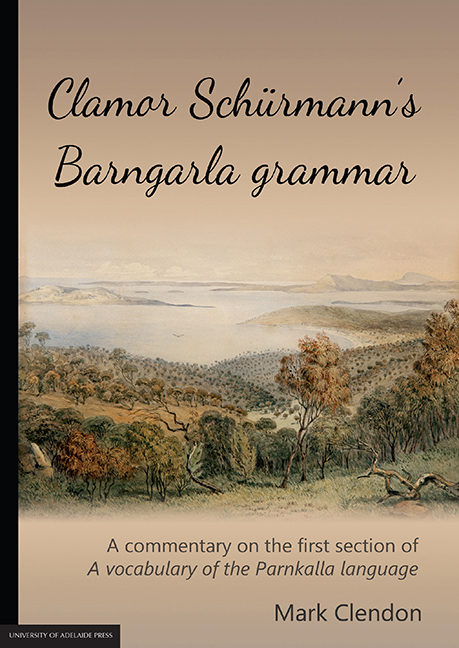 Clamor Schürmann's Barngarla grammar
Clamor Schürmann's Barngarla grammar Book contents
- Frontmatter
- Frontispiece
- Contents
- Abbreviations used in glossing sentence examples & in the text
- Preface
- Map: The northern and western Thura-Yura languages
- 1 Introduction
- 2 Writing Barngarla sounds
- 3 Pronouns
- 4 Intransitive verbs
- 5 Transitive verbs
- 6 Harry Crawford's Barngarla verbs
- 7 Suffixes on nouns
- 8 Other suffixes
- 9 Demonstrative & interrogative pronouns
- 10 Verbal derivational affixes
- 11 Non-finite verbs
- 12 Putting words together
- 13 Prospect
- Appendix The name Barngarla
- References
1 - Introduction
Published online by Cambridge University Press: 05 February 2016
- Frontmatter
- Frontispiece
- Contents
- Abbreviations used in glossing sentence examples & in the text
- Preface
- Map: The northern and western Thura-Yura languages
- 1 Introduction
- 2 Writing Barngarla sounds
- 3 Pronouns
- 4 Intransitive verbs
- 5 Transitive verbs
- 6 Harry Crawford's Barngarla verbs
- 7 Suffixes on nouns
- 8 Other suffixes
- 9 Demonstrative & interrogative pronouns
- 10 Verbal derivational affixes
- 11 Non-finite verbs
- 12 Putting words together
- 13 Prospect
- Appendix The name Barngarla
- References
Summary
This commentary will seek to recast the first twenty-two pages of Clamor Schürmann's 1844 Vocabulary of the Parnkalla language in the light of contemporary understandings about other Thura-Yura languages, and about Australian languages more generally.
We are unusually fortunate in having a nineteenth-century grammar and vocabulary of Barngarla of such a high standard. Not only was the Lutheran pastor and missionary Clamor Schürmann an intelligent and accomplished linguist, but as a native speaker of German he was unhindered by the etymologically transparent but transcriptionally disastrous conventions of English spelling. The work of the German Lutheran missionaries on South Australian languages in the first half of the nineteenth century has few contemporary parallels for thoroughness and clarity. We are, therefore, and comparatively speaking, in an excellent position to reconstruct a good deal of Barngarla's phonology and morphology, and some of its syntax.
Barngarla in geographical context
Barngarla is a member of South Australia's Thura-Yura group of languages, one that was spoken traditionally on the Eyre Peninsula and north into the Gawler Ranges as far as the southern end of Lake Torrens, but probably not along the peninsula's west coast. An historical survey of the Thura-Yura group is presented in Simpson & Hercus (2004), along with a review of features that distinguish these languages from, or unites them with, others around them; and with argumentation for an ultimate phylogenetic origin.
Thura-Yura languages historically constituted a dialect spread from the Mount Lofty Ranges in the southeast, up to the northern Flinders Ranges in the north, and across to South Australia's west coast. We know, for example, that the southern languages Kaurna, Nhukunu and Nharangga were mutually intelligible; that Adnyamathanha, Kuyani and Barngarla were mutually intelligible — at least near their margins — and that it is likely that Nhawu, Barngarla and Wirangu were also mutually intelligible, again near their margins at least. About Ngadjuri, we have almost no information at all. This kind of linguistic geography is observable in many parts of the world, and it is characteristic of small-scale traditionally oriented societies which have shared social institutions, in the absence of major geographical barriers.
Thura-Yura languages share a number of features — both phonological and morphological — which collectively serve to distinguish them from surrounding languages. A full inventory of these is presented in Simpson & Hercus (2004), while only a summary of their most noticeable features will be attempted here.
- Type
- Chapter
- Information
- Clamor Schürmann's Barngarla grammarA commentary on the first section of A vocabulary of the Parnkalla language, pp. 1 - 12Publisher: The University of Adelaide PressPrint publication year: 2015


